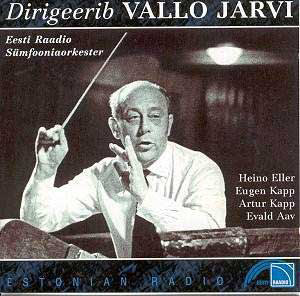Let us first of all extend all possible credit to Estonian
Radio for not taking the easy but oh so dull route of giving us Vallo
Järvi conducting Beethoven, or Tchaikovsky or Brahms. It took some
mettle to bring out a disc of completely unheard of Estonian music and
in sound that, while overwhelmingly secure, is not in the first flush
of youth.
The conductor Vallo Järvi (1923-1994) was the
elder brother of Nëeme Järvi. He never attained the international
reputation of Nëeme instead working with industry and insight within
Estonia. The Järvi parents were highly musical and positively encouraged
the two sons. Both Vallo and Nëeme played percussion at first.
From 1942 to 1949 Vallo played in the Estonian Radio SO conducted by
Olav Roots and Priit Nigula. After the war he studied conducting at
the Tallinn Conservatory and made his baton début in 1949 with
Milyutin's operetta Inconstant Happiness. Graduating to conducting
at the Estonia Theatre he directed 28 operas, 49 ballets and 19 operettas.
These included Glazunov's Raymonda, Stravinsky's Firebird,
Tamberg's Ballet-Symphony, Kalman's Countess Maritza,
Verdi's Trovatore and Aida, Prokofiev's Romeo and Juliet
and Tchaikovsky's Onegin and Mazeppa.
In this recording Eller's Five Pieces for Strings
evince a stridently raw tone. There is a little tape flutter
at the start but essentially the sound is very clear and brilliant.
The music and the playing is muscular, elegantly and lightly dancing
and nostalgic. This communicates far more strongly than the blanched
out tone of Sibelius's Rakastava. This is Baltic string music
at its early twentieth century zenith. In English music we might well
compare these pieces with Holst's Brook Green. These are arrangements
of pieces written by the composer between 1916-19. They were made in
1953.
Eugen Kapp's most famous works are reputed to
be his opera The Flames of Vengeance and the ballet Kalevipoeg.
Järvi is here caught in 1962 conducting dances from the ballet
- not the complete work. The first movement is cheeky and forward-striding
- rather romantic like Richard Rodney Bennett in his accessible film
music (Lady Caroline Lamb and Far From the Madding Crowd).
The Intermezzo is a most un-intermezzo-like Intermezzo with black-hearted
brass imprecations - melodramatic and minatory rather like the Calif's
brass motto in Sheherazade. The final set of glittering variations
- flighty and flouncy.
Eugen Kapp is the
son of Artur Kapp, the composer of Kalevipoeg.
The Prelude Graves is a lower key piece
with Tchaikovskian harp work and many intriguing
details in the woodwind. The scorching protest
of the drums and rasping brass at 5.01 are
memorable as is the steady pace and slightly
melancholy theme. Graves was written
in Astrakhan in a depressive state brought
on by the terror and pogroms of the Communist
uprising. Vallo Järvi also conducted
Artur Kapp's First Symphony. Is it possible
that Estonian Radio will issue his recording
of that work.
Evald Aav died at the age of 39 three years
after he had completed Life. His works included an opera, Vikings
premiered in Tallin in 1928. He was a pupil of Arthur Kapp. Evald
Aav's diptych tone poem is of symphonic proportions lasting well
over half an hour. Hustling energy is contrasted with musing interludes
tying in with the declared 'plot'. Aav speaks of life and its onward
rush (echoes of Nielsen's Fourth here?), the tendency to stand aside
from the stream and being drawn back into its pell-mell rush. The composer
is saying we are the victims as well as the celebrants of life. The
style is more modern but the psychology and topography is that of Tchaikovsky's
Manfred and Francesca. I also thought of the turbulence
of the Karlowicz tone poems (see my review of the Salwarowski set elsewhere
on this site). It is a rather rambling piece and can be compared with
a sort of Baltic Elgar's Froissart or Glazunov's Oriental
Rhapsody but at greater length. It has some noble moments as at
16.48 in the first movement. Aav finds much greater subtlety in the
second part. The idyllic Bax or the mystical Charles Martin Loeffler
come to mind. The pebbly sound (remember this is the oldest recording
of the four) of a solo piano seems to emphasise the mood of pagan retreat
and sad cypresses. There are some startlingly impressionistic touches
like the fruity squeals of flute from 5.45 onwards in track 10. This
is rather like Lemminkainen's Return with some rapturously swirling
music for the strings. The harp swirls at 10,30 are lovely and recall
Rimsky's Sadko sea picture. At the end the nobly protesting brass
from the first part. It is a little repetitive yet it has a freshness
that more organised composers and performers aspire to yet never capture.
Vardo Rumessen is the moving force behind this project
and we should be enduringly grateful to him for his industry and perception.
Now where are volumes 2 and 3, please?
Rob Barnett


